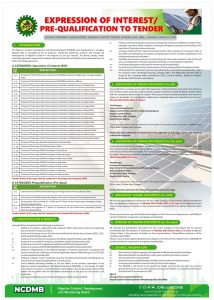May 13, (THEWILL)- Electricity Consumers, industry experts, insiders and other stakeholders have expressed the doubt about the relevance of the recent unbundling of the Transmission Company of Nigeria (TCN) into two entities in solving the notorious electricity challenge that has bedeviled Nigeria for decades.
The Nigerian Electricity Regulatory Commission (NERC) recently announced that it has unbundled TCN by establishing the Nigerian Independent System Operator of Nigeria Limited (NISO).
NERC made this known in a circular dated April 30.
By this development, TCN is expected to transfer all market and system operation functions to the new company, while TCN takes charge of transmission of power to the distribution companies (DisCos) while the generating companies (GenCos) remain the source of power .
According to the announcement, the commission had previously issued transmission service provider (TSP) and system operations (SO) licences to TCN, in accordance with the Electric Power Sector Reform Act.
However, the Electricity Act 2023, which came into effect on June 9 of that year, provided clearer guidelines for the incorporation and licensing of the independent system operator (ISO), as well as the transfer of assets and liabilities of TCN’s portion of the ISO.
Therefore, in the circular, the commission ordered the Bureau of Public Enterprises (BPE) to incorporate, unfailingly on May 31, a private company limited by shares under the Companies and Allied Matters Act (CAMA).
The company, NERC said, is expected “to carry out the market and system operation functions stipulated in the Electricity Act and the terms and conditions of the system operation licence issued to TCN”
“The name of the company shall, subject to availability at Corporate Affairs Commission, be the Nigerian Independent System Operator of Nigeria Limited (“NISO”),” NERC said.
Citing the object clause of the NISO’s memorandum of association (MOU) as provided in the Electricity Act, NERC said the company shall “hold and manage all assets and liabilities pertaining to market and system operation on behalf of market participants and consumer groups or such stakeholders as the Commission may specify”.
The new ISO, the commission said, will also be responsible for negotiating and entering into a contract for the procurement of ancillary services with independent power producers and successor generation licensees.
Also, it will generally carry out market and system operations functions as specified under the Electricity Act and the terms of its licence in the interest of market participants and system users.
NERC said the company is expected to carry out all market and system operation-related contractual rights and obligations handed over by TCN,
THEWILL sought clarification of the new arrangement from industry experts and, more especially, employees of TCN who volunteered the necessary information but pleaded for anonymity as they do not have the authority of their employer to speak on the matter.
A management staff member of the organisation in Lagos said that the arrangement is not new. He explained that four entities emerged from the carcass of the unbundled national power company, Power Holding Company of Nigeria (PHCN) which the Power Reform Act of 2003, enacted ten years after the unbundling of PHCN in 2013, substituted.
These are the GenCos (power providers), Independent Service Operators (grid operators), Transmitting Company (power conveyors) and the DisCos (distribution of power to the final consumers).
According to the source, the ISO has been existing and performing its function of evacuating power from the GenCos, and selling to the DisCos via the Transmitting entity. He said, successive administrations and TCN leadership were reluctant to allow the ISO operate independent of TCN because “that is where the meat is”.
According to him, the ISO ‘unit’ under TCN relates with the GenCos and the DisCos buy buying power from the GenCos) and selling to he DisCos but “the DisCos are the trouble Nigeria has”.
He explained to THEWILL that the DisCos do not accept the volume of power alloted to them by the GenCos on the flimsy excuses that they do not have the capacity to carry the entire volume. Some also claim that a large population of their consumers are chronic debtors and would not pay for the power they receive.
“The GenCos constitute a cesspool of corruption. They would prefer to sell power to unmetered consumers on estimated billing band and charge them outrageously far above the service actually rendered.
“Again, under the Electricity Reform Act, the DisCos are required to provide and elevate the power infrastructure such as the transformers, transmission wires, cables and metres to the consumers. But the consumers most of these items yet they do not enjoy electricity supply that is commensurate with the money they spend,” the source said.
He lamented that the DisCos collect the money from the consumers but fail to invest in infrastructure thereby defeating the purpose of the initiative.
“It is not a matter of unbundling, it is tackling the corruption in the system. Why do the DisCos play tricks with the metre supply? Why has it taken us this long to have every electricity consumer metred?” Is it not the same people that will man the unbundled entities?”asked another insider in Abuja TCN.
The Nigeria Electricity Report by the National Bureau of Statistics (NBS) for Q3 2023 revealed that the number of estimated-billing customers of the 11 DisCos increased to 6.03 million from 5.9 million year-on-year.
The report stated that “estimated customers during the quarter were 6.03 million, higher by 0.53 per cent from 6.00 million in Q2 2023. On a year-on-year basis, estimated customers increased by 2.02 per cent in Q3 2023 from 5.91 million in Q3 2022”.
TCN contacts reached out to say they have changed roles and are no longer in the position to speak on the matter. A member of Ikeja Electric Distribution Company who would not want his name disclosed, denied the allegation of corruption against the DisCos. “We distribute what we receive, we are in business, why would a DisCo decline off-take of the volume of power allotted to it?” he asked.
Nigeria, with a population of over 200 million rely on about 5,000 megawatts of electricity which makes life and businesses unbearably expensive.
Amid this challenge, the federal government recently approved a tariff hike in electricity which makes the people pay more for darkness than electricity supply.
The new electricity Act signed by President Bola Tinubu, which allows states to establish their own power generating facilities will help to ameliorate the situation eventually.
Sam Diala is a Bloomberg Certified Financial Journalist with over a decade of experience in reporting Business and Economy. He is Business Editor at THEWILL Newspaper, and believes that work, not wishes, creates wealth.







